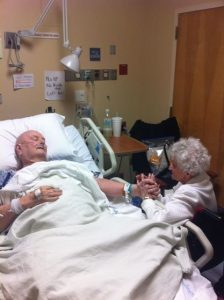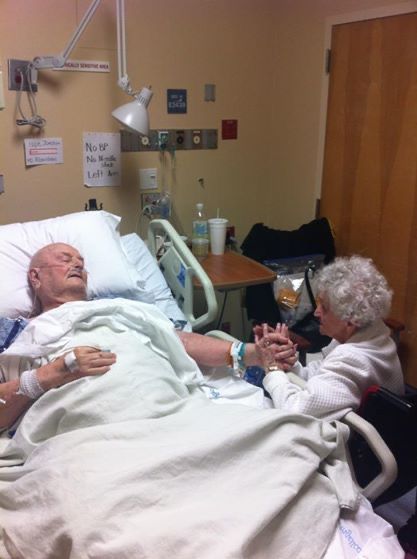The hospital room was quiet, dimly lit by a single lamp above the bed. Machines beeped steadily, their rhythm eerily calm, as if counting down the final moments of a long, remarkable life.
George Whitmore, ninety-two years old, lay motionless on the bed, his frail body a stark contrast to the strength he had once carried. By his side sat Margaret, his wife of seventy years, her silver hair glowing softly under the warm light. Her hands—still steady despite the years—were wrapped around his left hand, holding it with a tenderness that only decades of love could explain. The nurses passed by, murmuring softly and stealing glances at the couple. On the wall, just above the medical equipment, was a handwritten note that read: “No BP. No IVs. Left Arm Only.” To most, it seemed like standard hospital instructions. But to Margaret, that sign carried the weight of a lifetime.
Two weeks before, George had suffered a stroke. One moment he was reading the newspaper at the kitchen table, and the next, he had slumped over, his teacup shattering on the floor. Margaret had screamed for help with a force she hadn’t realized still lived in her chest. The ambulance had arrived swiftly, but the doctors’ verdict was grim—severe brain damage, paralysis on the right side, and no ability to speak. “Maybe days, maybe a week,” the doctor had said gently, but Margaret already knew: George was still in there. She could feel it.
Margaret had made one request of the hospital staff: leave his left hand untouched. No needles, no wires, no blood pressure cuffs. When they asked why, she simply said, “Because he promised.”
And though they didn’t understand, they respected her wish. What they didn’t know was that back in 1965, George had taken her hand during a summer storm and whispered a promise—
“If I ever can’t speak to you, if I’m ever trapped in my own mind, I’ll talk to you through my left hand. One squeeze for yes. Two for no.”
Margaret had laughed back then, amused by his poetic soul. But he had looked her in the eyes and said, “You’ll know it’s me. Just trust the left hand.”
Now, fifty years later, she was waiting for that hand to speak. Ten long days passed. She talked to him constantly—about their travels, their children, the garden he used to tend. She asked questions, waited in silence. No response. She watched his face for signs, felt his fingers for movement. Nothing. Until the morning of the eleventh day. She had dozed off in her chair, her fingers still wrapped around his, when suddenly—squeeze. Her eyes flew open. Her heart pounded. She stared at his face, still motionless. “George?” she whispered. Then it came again. One squeeze.
Tears filled her eyes. It was real. He was still there. The promise wasn’t just a romantic notion—it was his lifeline. That day, she asked him question after question. “Do you remember our honeymoon in Paris?” One squeeze. “Are you afraid?” Two squeezes. “Do you want to fight this?” A long pause. Then—Two squeezes. Her heart clenched. She leaned close to his ear. “Do you want to rest, love? Do you want me to let you go?” This time, the pause was longer. Her fingers started to tremble. And then—One slow squeeze.
The next morning, Margaret told the doctors and her children. She wanted the machines turned off. No more medications, no more interventions. They protested at first, concerned for her mental state. But she stood her ground. “He told me. He’s ready.” They saw the calm in her eyes, the steadiness in her voice, and they understood—this wasn’t a goodbye out of desperation. It was one of understanding. One of trust.
The family gathered that evening. Grandchildren flew in. Old photographs were passed around. Stories were told. Laughter and tears filled the room. But through it all, Margaret remained at his side, holding his left hand. Whispering softly. Reminding him of every life they’d built together. Then, as the sun began to set, his fingers moved again. Not just a squeeze this time, but deliberate motions. He began tracing letters on her palm.
T… A… K… E. Then again. C… A… R… E. She gasped. “Take care,” she whispered. And one final word. L… O… V… E. “Love.” The last thing he would ever say to her. That night, George passed away peacefully, his hand still in hers.

At the funeral, Margaret wore a simple silver bracelet on her wrist—one small charm in the shape of a hand. When asked about it, she would smile and say, “It’s a promise fulfilled.” She never remarried. Never needed to. Because George had left her with something no one else could give—a love that endured through silence, through pain, through death. A love that spoke not through words, but through a touch. Through a left hand.
And in that hospital room, beneath the quiet hum of machines and the soft rustle of sheets, two people had proven that even as the body fails and words fade, love will always find a way to speak.
The moral of the story is this: true love doesn’t need grand declarations or perfect moments. It lives in promises kept, in quiet understandings, in the strength to let go, and the courage to hold on—sometimes through nothing more than the gentle squeeze of a hand.


